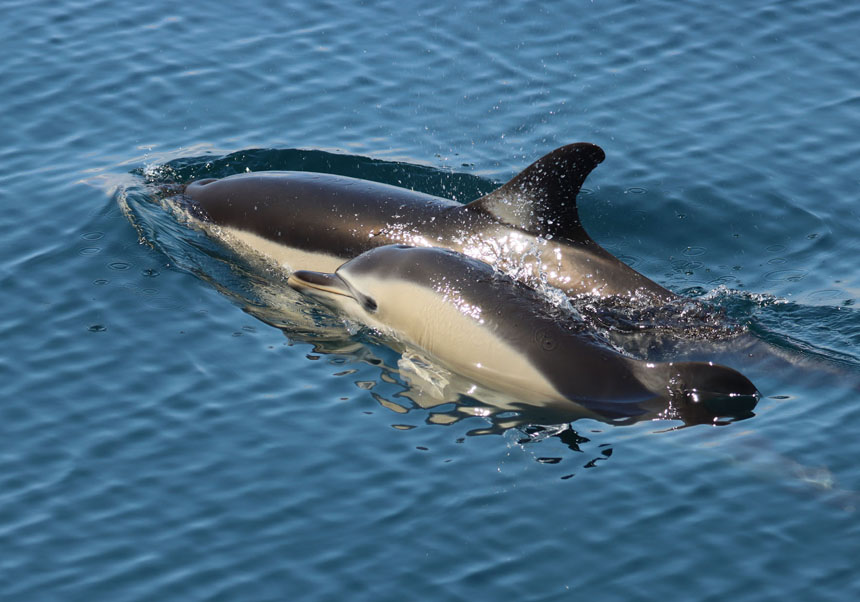The University of Valencia participates in a project of the Horizon Europe programme to reduce marine megafauna bycatch
- Scientific Culture and Innovation Unit
- November 30th, 2023

Researchers of the University of Valencia (UV) participate in REDUCE (Reducing bycatch of threatened megafauna in the east central Atlantic), a project funded by the EU Horizon Europe program, to promote more sustainable fisheries management and reduce the bycatch of the most threatened marine wildlife. This initiative has thirteen partners from five different countries and it will help protect marine biodiversity and promote the sustainability of European long-distance fisheries in the East Central Atlantic. The project has been funded with almost 9 million euros.
Every year, around 70,000 turtles and 200,000 seabirds die due to fisheries bycatch by the EU fishing fleets. These examples, which could be extended to other marine species, reveal the real dimension of the environmental impact generated by the bycatch problem, derived from the interaction between the fishing fleet and the marine megafauna. The bycatch of threatened species represents also a problem to the fishing industry with severe economic and legal consequences.
The REDUCE project will be carried out from January 2024 to December 2027 and unites three key entities within the UV: the Marine Zoology Unit (MZU) of the Cavanilles Institute of Biodiversity and Evolutionary Biology, the Image Processing Laboratory (IPL) and the Department of Statistics and Operational Research of the Faculty of Mathematics.
David March, CIDEGENT distinguished researcher at the MZU and team lead of the Spatial Marine Lab explains: “the REDUCE project will provide a unique opportunity to assess fisheries bycatch from European long-distance fleets and develop innovative science-based strategies to mitigate its impact on marine megafauna”. The MZU’s research is dedicated to conservation biology and parasitology of marine vertebrates, boasting extensive expertise in assessing marine vertebrate health and engaging in marine spatial planning and habitat modelling. Participation of the MZU also features senior researchers Francisco Javier Aznar and Francisco Montero, as well as PhD candidates Sofia Ten and Greta Jankauskaite.
Verónica Nieves, CIDEGENT distinguished researcher at the IPL comments: “Machine learning will play a crucial role in the automated identification of bycatch species from images, addressing limitations that have persisted with current techniques”. The IPL is globally committed to advancing data analysis techniques for addressing challenges in remote sensing and geoscience. The AI4OCEANS group at IPL (spearheaded by V. Nieves) will take the pivotal role of crosscutting data product analysis using cutting-edge AI tools for bycatch and data harmonisation.
David Conesa and Antonio López-Quílez, full professors at the Department of Statistics and Operational Research, are part of several national and international projects devoted to the use of hierarchical Bayesian Spatio-Temporal models accounting for the intrinsic autocorrelation of spatial data. Applications of their work have had relevant results in areas such as Land Use management, disease mapping, gentrification, species distribution, and child abuse among many others. David Conesa says: “Identification of bycatch species will be performed by means of hierarchical Bayesian Spatio-Temporal models that take into account the intrinsic autocorrelation of the species distribution”.
Bycatch can account for up to 40% of total fishing catches, globally reaching as much as 38 million tonnes discarded per year. This volume of bycatch disrupts the oceanic food chain and can pose a threat to the survival of species already under pressure from various other human activities.
Several national and international regulations share an objective, which is also featured in the EU Biodiversity Strategy: making fisheries compatible with environmental protection measures to conserve threatened marine species. The REDUCE project will focus specifically on developing and testing new technologies and management strategies for better assessing, monitoring and reducing the bycatch of birds, turtles, cetaceans, sharks and rays in the European long-distance fishing fleet of trawlers, purse-seiners and longliners, operating in Atlantic Ocean waters from the coasts of the Iberian Peninsula to Macaronesia and the Gulf of Guinea.
Bycatch of seabirds and turtles is only the most visible tip of the iceberg. While the risk of extinction of many threatened seabird and sea turtle species is well known, the conservation status of many species of cetaceans, sharks and rays in these marine regions is of no less concern.
This initiative aims to enhance fisheries monitoring programs, incorporating electronic monitoring, promote understanding of bycatch and its impacts across scientific, economic, and societal dimensions, and assess potential mitigation measures. Developing sustainable solutions for bycatch requires integrating diverse sources of scientific data and critically evaluating current marine governance frameworks in the areas targeted by REDUCE. This process involves close collaboration with industry and authorities, including those in Western African countries. Addressing this significant challenge aligns with the international treaty adopted by the UN in March 2023 to protect marine biodiversity areas beyond national jurisdictions (Areas Beyond National Jurisdiction, BBNJ).
REDUCE project
Its consortium is made up of thirteen partners from five different countries: Spain, Portugal, France, Senegal and the UK. Full partners include the universities of Barcelona, Valencia, Santiago de Compostela and Coimbra; the Institute of Marine Research (IIM) and the Spanish Institute of Oceanography (IEO) from the Spanish National Research Council (CSIC); the Technology Centre of the Sea – CETMAR Foundation (CETMAR); the Research Institute for Development (IRD); the Interdisciplinary Centre of Marine and Environmental Research (CIIMAR); the Research Centre in Biodiversity and Genetic Resources (CIBIO-BIOPOLIS) the company DATAFISH and the Regional Partnership for the Conservation of Coastal and Marine Zones (PRCM). BirdLife International and the Marine Biological Association, both with their headquarters from the United Kingdom, will be associated partners in this project.
Annex photo caption:
Fishing boat in Porto. Photo: Claudia Rodrigues.
File in: Institut Cavanilles de Biodiversitat i Biologia Evolutiva , Recerca, innovació i transferència , Difusió i comunicació científica , Laboratori de Processament d'Imatges (IPL) , Estadística i Investigació Operativa , Internacionalització recerca , Cultura Científica , Facultat de Ciències Biològiques , Escola Tècnica Superior d'Enginyeria , Facultat de Ciències Matemàtiques , Investigació a la UV



















